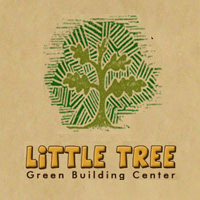
Little Tree Bali - Green Building Centre
by email
by phone
Customer Service
+62 (0) 81139605497
If you have a special request please feel free to contact our staff directly.
in our store
Now open from Monday to Saturday:
8:00 - 17:00
Get Smart in Bali
Published in FRV Travel on 01 June 2013 How one little tree in Bali has grown and branched out to provide eco- solutions to the island’s booming building development. Text: Katie Truman
As anyone in Bali can testify that hotel, resort and villa building is at unprecedented levels, especially in the island’s south, a phenomena in part fuelled by rising tourist numbers, predicted to reach five million foreigner tourists by 2015. It doesn’t seem to be slowing down, either, as Bali’s accommodation construction industry is estimated to be at 15 per cent growth, in line with the holiday island’s booming economy. Indonesia’s Central Bureau of Statistics predicts 12,000-plus new rooms entering the market from 2012 to 2016 – enough to make the mildest environmentalist choke on their organic, locally-sourced veggies.
It’s hardly rocket science that all this relentless building expansion has a considerable negative impact on the environment and natural resources, affecting water quality and supply, electricity demand, landscapes, even traffic and greenhouse gas emissions. Fortunately this island is home to some smart eco-visionaries, like Austrian-German Christian Fritz, who have the foresight to address environmental problems with long-term solutions.
A champion of waste-to-energy technology and Bali’s small local businesses (founding member of Bali Export Development Organization), socio-eco entrepreneur Fritz has over 12 years of sustainable development experience in Indonesia.
Believing that “Buildings make a considerable impact on the environment and natural resources”, and committed to providing top-rate services and platforms for creating ecologically smart, cost-efficient and high-quality building developments, Fritz co-founded Little Tree in 2008, Bali’s first one-stop green building material and home supply store. The “Little Tree” moniker came about when one of the principle partners watched a small jungle in Legian uprooted to make room for a resort beside his home. One tiny tree was rescued from developers, replanted and now flourishes in a green oasis in the eponymous building.
The “Little Tree” moniker came about when one of the partners watched a small jungle uprooted to make room for a resort beside his home.
Aiming to help people in Bali to build in environmentally-friendly, energy-efficient ways (the company building is itself the epitome of green building design), Little Tree showcases top range, eco-friendly green building materials and home supplies, mainly Indonesian, from eco-certified woods to zero toxic emission paints and is Indonesia’s biggest supplier for D2W sustainable packaging.
“Green buildings are only part of the solution to environmental problems,” admits Fritz. “However, it’s a conscious effort to reduce environmental and human health impacts and not just about building supplies, but understanding how we can best utilize the local environment to reduce our impact on nature.”
This year, Little Tree rebranded and re-launched as ecoSmart “Building solutions for life” offering energy, water, waste, buildings and design/consulting solutions. Organically developing from Little Tree, ecoSmart’s “Green Team” concept runs in partnership with a consolidation of small, eco-committed businesses, experts from waste treatment to architecture, who have extensive experience working in the region and understand local conditions. Their Green Team assists new developments or existing operations – from individual homes to condotels and big resorts – with an integrated, customized building approach, from assessment to installation; not only reducing ecological footprints but reducing operational costs.
So the million dollar (or rupiah) question is: are hospitality properties signing up for ecoSmart’s services? Previously Little Tree worked with mainly individual homeowners or small eco-resorts, but now upgraded, ecoSmart is equipped to assisting larger developments, like four and five-star resorts, which dominate Bali’s accommodation development.
“Our new refined one-stop solution approach is able to provide large developers and property owners and managers solutions, not only saving them money on utility bills, but often more competitively priced, longer-life and lower maintenance,” explains Fritz. “So we’re seeing more interest from villas, hotels and resorts, particularly focused on energy and water related issues, and towards more environmentally-friendly building materials”.
The bestselling energy-saving products apparently are LED lighting and new-design solar hot water systems specifically designed for tropical climates. With Bali facing a worsening water crisis, buildings need to increase their dependence on water collected, used, purified, and reused on site. ecoSmart offers hi-tech solutions to treat and purify water from any source and desalination with low-energy, low-waste technology; a bigger investment, but creating long-term returns, which some savvy larger hotels are willing to take on board. Showers saving 50 per cent water and water-free urinals, saving around 150,000 litres of water annually, are also a hit, as are sustainable flooring alternatives – bamboo, rubber wood and coconut – and locally manufactured Teak Plastic Composite, made from 90 per cent recycled materials, used for decking, replacing – and outlasting – tropical forest timbers. ecoSmart have also produced 100 per cent natural plant-based non-toxic and non-chemical, commercial cleaning products.
Awareness is half the battle. Committed to educating the market and community on environmental issues, ecoSmart actively supports local green initiatives and welcomes as a community information and seminar centre, where organizations and community groups converge to push Bali’s sustainability agenda forward – this year’s, “LOHAS – Lifestyle of Health and Sustainability” event in partnership with LOHAS Asia, is one example.
ecoSmart aims to become the leading provider for sustainable and natural ecological and economicial development solutions (SEEDS!) and ensuring that eco-friendly practices and sustainability is reality for Indonesia. Their 2015 goal is the realization of a Sustainable Development Fund for Indonesia (ISDF) to facilitate projects and capitalize companies focused on renewable energy, sustainable production and tourism. Hopefully more hotels, resorts and villas will make a smart move for the environment.

